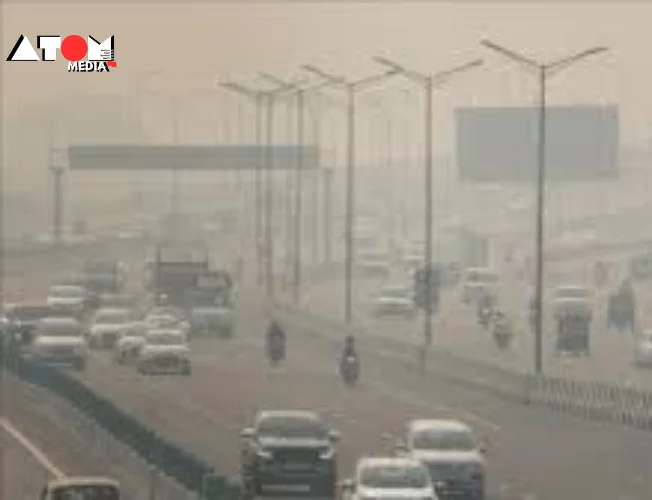As Delhi grapples with a resurgence of toxic air, residents face a heightened risk to their health due to the dangerously high Air Quality Index (AQI). The national capital’s pollution levels have reached ‘very poor’ categories, threatening lung health, especially for those with pre-existing conditions. With the upcoming festive season and stubble burning in nearby regions, the situation is expected to worsen, making it critical for residents to take urgent steps to protect themselves and their families.
The Growing Threat of Delhi’s Air Pollution
Delhi’s air quality has deteriorated to hazardous levels, with fine particulate matter (PM2.5 and PM10) permeating the atmosphere, making it difficult to breathe. According to the System of Air Quality and Weather Forecasting and Research (SAFAR), Delhi’s AQI is classified as ‘very poor,’ and the Indian Institute of Tropical Meteorology warns of further deterioration due to external factors like stubble burning. This toxic air poses severe risks to vulnerable groups, including children, the elderly, and individuals with respiratory or heart conditions.
Dr. Sachin Kumar, Senior Consultant in Pulmonology and Critical Care Medicine, advises that people with existing health conditions, such as asthma or chronic lung disease, must take immediate precautions to avoid exposure to polluted air. He also highlights the increased risks for pregnant women, children, the elderly, and outdoor workers who are most likely to experience adverse health effects from prolonged exposure.
Life-Saving Tips to Protect Your Health During Poor Air Quality
1. Regularly Monitor AQI Levels:
When the AQI exceeds 300, the air is deemed hazardous. Even moderate levels of pollution can affect respiratory health. As winter sets in, temperature inversion can trap pollutants closer to the ground, intensifying air quality issues. Use apps or websites that provide real-time AQI updates to stay informed and take necessary precautions.
2. Stay Indoors During Peak Pollution Times:
Limit outdoor activities, particularly during peak pollution hours in the early morning and late evening when pollution levels are higher. If you must go outside, minimize the time spent outdoors.
3. Wear a Proper Mask:
Wearing an N95 or P100 mask can provide better filtration and protect you from inhaling harmful pollutants like PM2.5 and PM10. Even if COVID-19 is not a concern, these masks can help filter out toxic particles, safeguarding your respiratory health.
4. Purify Indoor Air:
Using air purifiers can significantly reduce indoor air pollution. Place air purifiers in your living room, bedroom, and other common areas to improve indoor air quality. Regularly replace filters to ensure optimal performance. You can also add indoor plants like succulents, which are known to help purify the air and improve oxygen circulation.
5. Eat a Nutritious Diet to Support Respiratory Health:
A healthy diet rich in antioxidants, vitamins, and minerals can help strengthen your immune system and support lung function. Include foods like leafy greens, berries, and foods high in omega-3 fatty acids to combat inflammation caused by polluted air.
6. Stay Hydrated:
Drinking sufficient water throughout the day helps flush toxins from the body. Staying hydrated is especially important during periods of poor air quality, as it aids in maintaining healthy lung function and supports your body in eliminating harmful substances.
7. Consult Your Doctor Regularly:
If you have pre-existing respiratory conditions, such as asthma or COPD, it’s crucial to consult your healthcare provider for guidance on managing your health during episodes of poor air quality. Follow their advice and keep any necessary medications on hand.
8. Adhere to Your Medications:
If you take medications for respiratory issues or other chronic conditions, ensure you follow your prescribed routine and don’t skip doses. Consistent medication use can help manage symptoms and prevent complications during times of poor air quality.
How Air Pollution Affects Your Health
Prolonged exposure to high AQI levels can exacerbate respiratory diseases, cause cardiovascular problems, and lead to the development of new health conditions. The tiny particulate matter in the air can penetrate deep into the lungs, leading to inflammation, reduced lung function, and an increased risk of respiratory infections. For vulnerable groups, such as children, the elderly, and pregnant women, the consequences can be even more severe.
Protecting Your Family from Air Pollution
Protecting your family from toxic air starts with being aware of pollution levels and taking preventive steps. Make your home an air-safe environment by using air purifiers, limiting outdoor activities during high pollution times, and encouraging everyone to wear protective masks. Monitor your children’s health closely, and ensure they avoid exposure to polluted air whenever possible.
As Delhi faces another season of severe air pollution, taking these simple yet effective steps can help protect your lung health and minimize the impact of poor air quality on your family. Stay informed, stay safe, and prioritize your well-being during this challenging time.
Read more: Marketing News, Advertising News, PR and Finance News, Digital News





